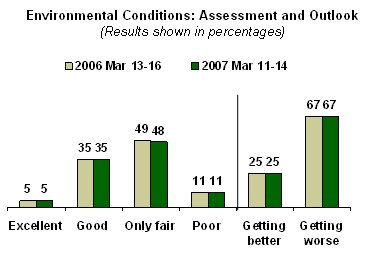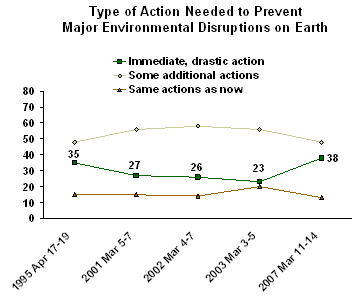GALLUP NEWS SERVICE
PRINCETON, NJ -- According to Gallup's annual Environment Poll, Americans' views about environmental quality or the need for pro-environmental action barely changed during the past year. Yet given how public concern for other issues -- including energy, healthcare, unemployment, and terrorism -- fell during the same period, it is noteworthy that concern for the environment is holding steady or even rising slightly since March 2006.
One example of this from the Mar. 11-14, 2007, survey is the fact that the environment has reclaimed the top position on Gallup's ranking of what Americans perceive will be the "most important problem" facing the country 25 years from now. This is due in part to a slight increase in the percentage mentioning the environment (from 8% in 2006 to 14% today), but also because the percentages mentioning other issues, such as energy, Social, Security, or the economy, are down compared with the past several years.
|
Looking ahead, what do you think will be the most important problem facing our nation 25 years from now? [OPEN-ENDED] |
|||||||
|
Mar
|
Mar
|
Mar
|
Mar
|
Mar
|
Mar
|
Mar
|
|
|
% |
% |
% |
% |
% |
% |
% |
|
|
Environment/pollution |
14 |
8 |
6 |
8 |
9 |
10 |
11 |
|
Lack of energy sources/energy crisis |
8 |
10 |
5 |
2 |
8 |
5 |
7 |
|
Social Security |
8 |
10 |
23 |
10 |
5 |
6 |
8 |
|
Healthcare |
8 |
7 |
6 |
6 |
6 |
5 |
3 |
|
Terrorism |
7 |
3 |
4 |
4 |
5 |
5 |
-- |
|
Economy in general |
5 |
8 |
9 |
12 |
14 |
12 |
5 |
The same pattern is seen in the trend of a different question asking respondents to rate their concern about each of 12 different problems facing the country. The percentage of Americans saying they worry "a great deal" about the quality of the environment is essentially the same today as a year ago (43% in 2007 vs. 40% in 2006). However, this contrasts with a downward trend in concern seen for eight other issues. The only issues for which the percentage worried a great deal increased over the past year (albeit not by a statistically significant amount) are crime, the environment, and illegal immigration.
Still, the environment falls within a large group of mid-tier issues people are concerned about, ahead of unemployment and race relations, but below healthcare, Social Security, and crime.
|
Percentage Worried "A Great Deal" About Each Issue
|
|||
|
March
|
March
|
Change |
|
|
% |
% |
|
|
|
The availability and affordability of healthcare |
68 |
63 |
-5 |
|
The Social Security system |
51 |
49 |
-2 |
|
Crime and violence |
45 |
48 |
+3 |
|
Illegal immigration |
43 |
45 |
+2 |
|
Drug use |
48 |
45 |
-3 |
|
The quality of the environment |
40 |
43 |
+3 |
|
Hunger and homelessness |
43 |
43 |
0 |
|
The availability and affordability of energy |
48 |
43 |
-5 |
|
The possibility of future terrorist attacks in the U.S. |
45 |
41 |
-4 |
|
The economy |
43 |
39 |
-4 |
|
Unemployment |
31 |
25 |
-6 |
|
Race relations |
22 |
19 |
-3 |
Americans' ratings of current environmental conditions and respondents' perceptions about the outlook for environmental quality are nearly identical to where they stood a year ago, findings that are consistent with the general stability of public concern about the environment since 2006. Four in 10 Americans continue to rate environmental quality as either "excellent" or "good" and 25% of respondents continue to say the environment is getting better while 67% say it is getting worse.

Environmental Concern Greater Since 2002
The bigger story is the degree to which public concern about the environment has increased over the past four to five years. Since 2002, Gallup has seen substantial increases in the public's belief that the environment needs greater attention.
This is exemplified by a question asking whether extreme or only moderate measures are needed to address the planet's environmental problems. When Gallup last asked this question in 2003, only 23% of Americans said "immediate and drastic action" was required. Today that figure stands at 38%.
(Public opinion has been here before; a 1995 Gallup survey found support for drastic action similar to where it is today. However, current attitudes are a clear shift from the first few years under the Bush administration.)

The accompanying table summarizes the five-year comparison in several of the environmental attitudes tracked in Gallup's annual Environment survey. As this shows, public concern has increased by seven to 13 points over this period.
|
Summary of Environmental Attitudes -- 2002 vs. Now |
|||
|
March 2002 |
March 2007 |
Change |
|
|
% |
% |
|
|
|
Environmental quality "getting worse" |
54 |
67 |
+13 |
|
Immediate, drastic action needed |
26 |
38 |
+12 |
|
Worried "a great deal" about environment |
35 |
43 |
+8 |
|
Environmental conditions "only fair/poor" |
52 |
59 |
+7 |
Environment Sparks Differences Among Demographics
Women tend to be a bit more concerned than are men about the quality of the environment, as Gallup finds that 48% of women say they worry "a great deal" about the environment, versus 37% of men saying the same thing. Women are also more likely than men to say that environmental conditions are getting worse, 73% to 61%.
Some differences are also noted by age. Though younger and older Americans are similar in their evaluations of current environmental conditions, older Americans are significantly less likely than those under 65 to believe immediate and drastic action is required to address the issue.
|
Perceptions of Approach Needed to Solve Environmental Problems
|
|||
|
18- to 49-
|
50- to 64-
|
65 years old
|
|
|
2007 Mar 11-14 |
% |
% |
% |
|
Immediate, drastic action required |
40 |
42 |
27 |
|
Take some additional actions |
48 |
46 |
51 |
|
Continue same actions as taking now |
12 |
12 |
16 |
|
No opinion |
* |
1 |
5 |
|
* Less than 0.5% |
|||
However, Gallup finds the greatest differences between partisan groups. Democrats are roughly twice as likely a Republicans to worry a great deal about the environment (53% vs. 28%) and to perceive environmental quality as deteriorating (87% vs. 44%). Democrats are more than twice as likely as Republicans to consider current environmental conditions to be in only fair or poor shape (75% vs. 33%) and to call for immediate and drastic action to address environmental problems (47% vs. 19%).
Independents generally fall halfway between Republicans and Democrats in their views on issues, but not on the environment -- Gallup finds independents much closer to the Democratic end of the spectrum in regard to environmental issues.
|
Summary of Environmental Concern
|
|||
|
Republicans |
Independents |
Democrats |
|
|
2007 Mar 11-14 |
% |
% |
% |
|
Environmental conditions are "getting worse" |
44 |
71 |
87 |
|
Environmental conditions are "only fair/poor" |
33 |
69 |
75 |
|
Worry "a great deal" about quality of the environment |
28 |
47 |
53 |
|
Immediate, drastic action needed to address environmental problems |
19 |
46 |
47 |
Survey Methods
Results are based on telephone interviews with 1,009 national adults, aged 18 and older, conducted Mar. 11-14, 2007. For results based on the total sample of national adults, one can say with 95% confidence that the maximum margin of sampling error is ±3 percentage points. In addition to sampling error, question wording and practical difficulties in conducting surveys can introduce error or bias into the findings of public opinion polls.
